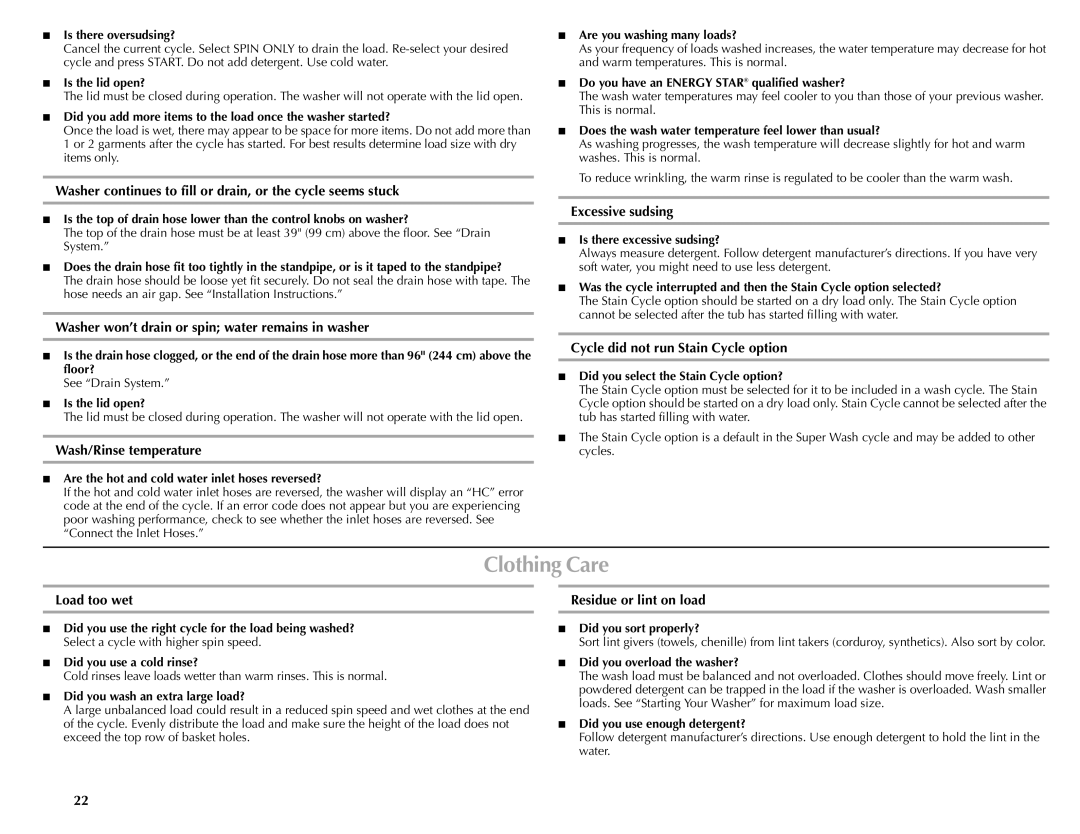
■Is there oversudsing?
Cancel the current cycle. Select SPIN ONLY to drain the load.
■Is the lid open?
The lid must be closed during operation. The washer will not operate with the lid open.
■Did you add more items to the load once the washer started?
Once the load is wet, there may appear to be space for more items. Do not add more than 1 or 2 garments after the cycle has started. For best results determine load size with dry items only.
Washer continues to fill or drain, or the cycle seems stuck
■Is the top of drain hose lower than the control knobs on washer?
The top of the drain hose must be at least 39" (99 cm) above the floor. See “Drain System.”
■Does the drain hose fit too tightly in the standpipe, or is it taped to the standpipe?
The drain hose should be loose yet fit securely. Do not seal the drain hose with tape. The hose needs an air gap. See “Installation Instructions.”
Washer won’t drain or spin; water remains in washer
■Is the drain hose clogged, or the end of the drain hose more than 96" (244 cm) above the floor?
See “Drain System.”
■Is the lid open?
The lid must be closed during operation. The washer will not operate with the lid open.
Wash/Rinse temperature
■Are the hot and cold water inlet hoses reversed?
If the hot and cold water inlet hoses are reversed, the washer will display an “HC” error code at the end of the cycle. If an error code does not appear but you are experiencing poor washing performance, check to see whether the inlet hoses are reversed. See “Connect the Inlet Hoses.”
■Are you washing many loads?
As your frequency of loads washed increases, the water temperature may decrease for hot and warm temperatures. This is normal.
■Do you have an ENERGY STAR® qualified washer?
The wash water temperatures may feel cooler to you than those of your previous washer. This is normal.
■Does the wash water temperature feel lower than usual?
As washing progresses, the wash temperature will decrease slightly for hot and warm washes. This is normal.
To reduce wrinkling, the warm rinse is regulated to be cooler than the warm wash.
Excessive sudsing
■Is there excessive sudsing?
Always measure detergent. Follow detergent manufacturer’s directions. If you have very soft water, you might need to use less detergent.
■Was the cycle interrupted and then the Stain Cycle option selected?
The Stain Cycle option should be started on a dry load only. The Stain Cycle option cannot be selected after the tub has started filling with water.
Cycle did not run Stain Cycle option
■Did you select the Stain Cycle option?
The Stain Cycle option must be selected for it to be included in a wash cycle. The Stain Cycle option should be started on a dry load only. Stain Cycle cannot be selected after the tub has started filling with water.
■The Stain Cycle option is a default in the Super Wash cycle and may be added to other cycles.
Clothing Care
Load too wet
■Did you use the right cycle for the load being washed? Select a cycle with higher spin speed.
■Did you use a cold rinse?
Cold rinses leave loads wetter than warm rinses. This is normal.
■Did you wash an extra large load?
A large unbalanced load could result in a reduced spin speed and wet clothes at the end of the cycle. Evenly distribute the load and make sure the height of the load does not exceed the top row of basket holes.
Residue or lint on load
■Did you sort properly?
Sort lint givers (towels, chenille) from lint takers (corduroy, synthetics). Also sort by color.
■Did you overload the washer?
The wash load must be balanced and not overloaded. Clothes should move freely. Lint or powdered detergent can be trapped in the load if the washer is overloaded. Wash smaller loads. See “Starting Your Washer” for maximum load size.
■Did you use enough detergent?
Follow detergent manufacturer’s directions. Use enough detergent to hold the lint in the water.
22
